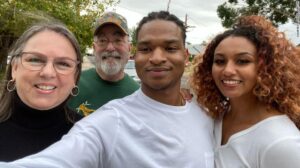Lesson 48 –
I Corinthians 1: 3-9
3 Grace to you and peace from God our Father and the Lord Jesus Christ.
4 I give thanks to my God always for you because of the grace of God that has been given you in Christ Jesus, 5 for in every way you have been enriched in him, in speech and knowledge of every kind — 6 just as the testimony of Christ has been strengthened among you — 7 so that you are not lacking in any spiritual gift as you wait for the revealing of our Lord Jesus Christ. 8 He will also strengthen you to the end, so that you may be blameless on the day of our Lord Jesus Christ. 9 God is faithful; by him you were called into the fellowship of his Son, Jesus Christ our Lord.
BACKGROUND
1 Corinthians is a letter to the Church at Corinth. In the first chapter of this letter, we get the reminder that the believers are spread out across geographic locations. When this happens, you can expect the faith community to have developed factions, disagreements and arguments internally. How do people in more rural communities follow the faith in comparison to city-folk? How do people closer to the water practice the faith (and its traditions), and how is faith practiced in landlocked communities? Who’s right? Who’s more authentic? In other parts of this chapter, you will find that Paul makes a specific appeal to address the divisions in the community of believers. In your own devotional period, read the entire first chapter of 1 Corinthians, focusing on the unique calls to Believer’s Unity that Paul makes. What do you think about “calls for unity?” Are there times when Unity is impossible?
Today’s lesson will focus on strengthening individuals to strengthen communities.
Read the scripture out loud together. Discuss with someone in your home. What is your superpower? What can you do with great confidence?
What’s happening during this passage?
Paul is writing to a dispersed faith community. The community of believers needs a word of affirmation before he begins offering some advice, and that’s exactly what we see in today’s few verses. Paul offers “grace and peace” and “thanks to my God always for you.” Paul affirms the community by reminding them that “the testimony of Christ has been strengthened among you” for the purposes of fortifying them each. None of them are at a disadvantage or lacking in “any spiritual gift.” Paul offers a word of encouragement that Christ will “strengthen you to the end.” Most of all, God calls people into the “fellowship of the son.”
What kind of community do you see here?
Some translations lack the word “my” in verse 4. So, this verse would otherwise read, “I give thanks to God always for you” rather than “I give thanks to my God always for you.” This may seem like a small shift, but it’s important to consider the shift in meaning.
What happens when we believe that God is a personal experience? What happens when we believe that God belongs to us personally? As we are watching currently, the Supreme Court has ruled that religious houses of worship can gather in ways health officials have warned against, lest the State be accused of unfairly targeting places of worship. So then, what are we saying about worship and faith communities when we believe that God is “personal” and cannot meet us wherever we are?
Why is it important for this community to get this particular message?
The people need to be reminded that all that they need is among them. For the original audience of this letter, correspondence would have been read out loud by a designated person at a house church. Not everyone was literate. And not everyone had an individual letter. People gathered in the community to hear a word.
So, when you see the word “you,” consider that this was not an individualized “you,” but a plural you. What if every time we saw the word “you,” we replaced it with the modern “y’all?”
“For in every way y’all have been enriched in him… just as the testimony of Christ has been strengthened among y’all, so that you all are not lacking in any spiritual gift…”
The meaning changes. Instead of these words being written for one person to apply it to their individual circumstance (as we often do as Christians 2,000 years later), this letter can instead be used to encourage a community of people. Communities, after all, are just collections of individuals who choose to do life together.
Have you ever felt like you have nothing to contribute? Or envious of other people’s gifts?
This is a natural, human reaction! Jealousy and envy are natural responses to the world around us! The most important thing is how we react to those responses. Do we throw tantrums, do we turn inwards and push everyone away, do we lash out? Or do we see others’ gifts as assets to us? If you cannot cook the entire Thanksgiving meal, is there a contribution you can make to the table? If you cannot do the viral dances that the children are doing, is there a dance that you can teach them? If you cannot sing the solo, can you be a strong choral voice?
What questions do you still have of this scripture? How will you commit to journeying with this text this week?
 Connection to Today’s World
Connection to Today’s World
In 2016, a White grandmother named Wanda Dench accidentally invited a Black teenager named Jamal Hinton to her house for Thanksgiving. She made a mistake dialing the phone number. But in the spirit of the holidays, they decided to link up anyway. After all, we could all use another friend, right? Since 2016, the unlikely pair have been spending the holidays together as a tradition. In interviews, they’ve talked about how unexpected their love and care grew for each other.
Particularly with the polarizing context of the 2016 election, this story went viral and picked up among many news outlets. People were looking, desperately, for good news about the possibility of genuine community. Not forced, not one-sided, not fake. People wanted to know that it was possible that two strangers of different races and generations could develop a fondness for one another. The story touched millions.
Sadly, earlier this year, Wanda’s husband Lonnie passed due to complications of the coronavirus. Lonnie was also featured prominently in those impromptu holiday selfies. When he passed, Wanda said she “wasn’t looking forward to it because Lonnie wasn’t going to be there.” So, this year, the tradition continued with a twist. Jamal and his girlfriend Mikaela covenanted to quarantine for two weeks prior to seeing Wanda for Thanksgiving 2020. At the table, they “told jokes and stories and shared memories of Lonnie.”
Journal: What song makes you feel connected to yourself and to your community?
Closing: Sing/watch “A Great Work,” by Brian Courtney Wilson.
Sometimes there are obstacles in the road
That can leave you feeling low
And you don’t know how to move forward
And sometimes there are turns you wanna take
But the way gets hard to trace
Now you’re wondering how did you get here
But don’t you give up
Until you see
How God is ordering your steps
So, you can walk into your seas
He that has begun
A great work in you
Is faithful to perform it
God is faithful to perform it
He that has begun
A great work in you
Is faithful to perform it
Our God is faithful
Prayer:
Dear God,
You are the center of our Joy. All that is good and perfect comes from you. You have equipped us all with unique skills and gifts. You have made us each different. And yet we know that our gifts are multiplied when we share them in our communities.
We are in need of reminders that you have equipped us. We are not mistakes. None of us is a waste. We are fearfully and wonderfully made, each one of us.
As we await the coming of Christ this Advent, teach us to offer our gifts to the world with abundance and generosity.
In Jesus’ name we pray, Amen.
WORKS CITED
https://www.workingpreacher.org/commentaries/revised-common-lectionary/first-sunday-of-advent-2/commentary-on-1-corinthians-13-9-5
https://www.cnn.com/2020/11/22/us/teen-grandma-thanksgiving-text-coronavirus-husband-trnd/index.html





